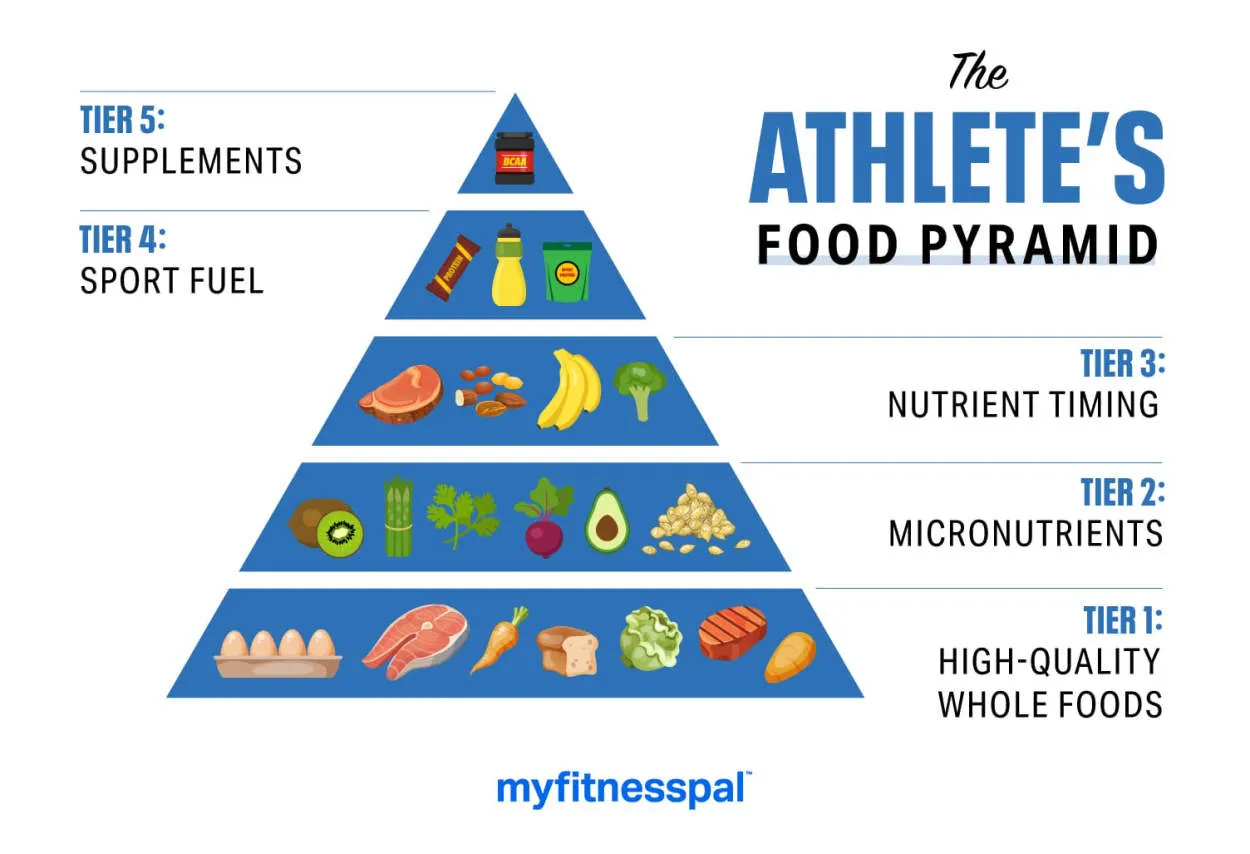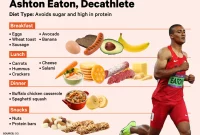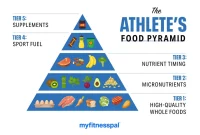Athlete’s Diet: Nourishing for Peak Performance
Essential Nutrients for Athletes
A well-balanced diet is crucial for athletes to perform at their peak. In addition to regular exercise and training, consuming the right nutrients can significantly enhance athletic performance and ensure optimal recovery. Here are some essential nutrients athletes need to include in their diet:
1. Protein
Protein is essential for muscle repair and growth. Athletes should consume high-quality sources of protein such as lean meats, poultry, fish, eggs, dairy products, legumes, and tofu. Aim for a sufficient protein intake to support muscle maintenance and recovery.
2. Carbohydrates
Carbohydrates provide the primary source of energy for athletes. Complex carbohydrates found in whole grains, fruits, vegetables, and legumes are the best choices. These carbohydrates release energy slowly, providing sustained fuel during physical activities.
3. Healthy Fats
Healthy fats are important for overall health and should account for a balanced diet. Athletes can incorporate sources of healthy fats like avocados, nuts, seeds, and fatty fish (such as salmon) into their meals. These fats contribute to optimal brain function and help absorb fat-soluble vitamins.
4. Vitamins and Minerals
Vitamins and minerals are crucial for numerous physiological functions, including energy production and muscle contraction. Athletes should focus on consuming a wide variety of fruits, vegetables, whole grains, lean proteins, and dairy products to ensure an adequate intake of these essential nutrients.
5. Hydration
Proper hydration is often overlooked but is of utmost importance for athletes. Staying hydrated helps maintain body temperature, lubricate joints, and transport nutrients. Athletes should drink water regularly throughout the day and replenish electrolytes lost through sweat during intense workouts.
6. Timing
Athletes should also pay attention to their nutrient timing. Consuming a balanced meal or snack with a combination of carbohydrates and protein before and after workouts can optimize performance, enhance recovery, and support muscle synthesis.
Remember, every individual is unique, and nutritional needs may vary depending on the sport, intensity of training, and personal goals. It is recommended that athletes consult a registered dietitian or sports nutritionist to personalize their dietary needs and maximize their performance.
Planning Your Pre-Game Meals
When it comes to excelling in sports, having a well-planned pre-game meal is essential for athletes aiming for peak performance. The right combination of nutrients and timing can provide the energy needed to perform at your best. Here are a few key points to consider when planning your pre-game meals:
-
Nutrient Balance:
Ensure your pre-game meal includes a balance of carbohydrates, proteins, and fats. Carbohydrates provide the primary source of energy, while proteins aid in muscle repair and recovery. Including healthy fats helps to maintain sustained energy levels.
-
Timing:
Time your meal appropriately to allow for digestion. Ideally, aim to consume your pre-game meal 2-3 hours before the start of your event or game. This timeframe allows for optimal absorption and utilization of nutrients.
-
Hydration:
Don’t forget to hydrate! Proper hydration is crucial for performance and should be a part of your pre-game routine. Drink water or sports drinks leading up to the event to ensure you enter it well-hydrated.
-
Familiarity:
Stick to foods that you’re familiar with and that you know won’t cause any digestive discomfort. Trying new or unfamiliar foods before a game can lead to unwanted surprises. Stick to easily digestible options for best results.
By following these guidelines and customizing them based on your individual dietary needs, you can create a pre-game meal plan that helps fuel your body and optimize your performance. Remember, consistency and experimentation are key in finding the best fuel for your athletic endeavors!
The Role of Hydration in Athletic Performance
Hydration is an essential factor that plays a crucial role in athletic performance. For athletes, maintaining proper hydration levels is vital for their overall health and peak performance.
Water is the most fundamental component of our bodies and is involved in various physiological processes. During exercise, the body loses water through sweat, leading to fluid imbalance. Dehydration can occur rapidly, especially in intense or prolonged physical activities.
When athletes are dehydrated, their performance is significantly affected. Studies have shown that even mild dehydration can impact endurance, strength, speed, and cognitive function. It can lead to fatigue, decreased concentration, and impaired coordination.
Proper hydration, on the other hand, helps to optimize athletic performance. It regulates body temperature, lubricates joints, and transports nutrients to the muscles. It also helps in the elimination of waste products, preventing muscle cramps and fatigue.
Athletes should prioritize hydrating before, during, and after their workouts or competitions. They should drink water regularly throughout the day to maintain adequate hydration levels. The American College of Sports Medicine recommends drinking at least 16-20 ounces of fluid two hours before exercising and 6-12 ounces every 15-20 minutes during exercise.
It is important to note that individual hydration needs may vary depending on factors such as body weight, environment, and exercise intensity. Sports beverages that contain electrolytes may be beneficial for athletes involved in intense or prolonged activities to replenish the lost electrolytes.
Overall, proper hydration is essential for athletes to perform at their best. Staying adequately hydrated before, during, and after exercise can help optimize their endurance, strength, and overall athletic performance.
Supplements: Are They Necessary?
When it comes to an athlete’s diet, ensuring proper nourishment is crucial for achieving peak performance. While a balanced diet rich in nutrients is generally sufficient, many athletes consider incorporating supplements to enhance their athletic performance. The question is, are supplements really necessary?
To answer this, it is important to understand that each athlete has unique nutritional needs based on their sport, training intensity, and individual physiology. While some athletes may benefit from certain supplements, others may not require them at all.
Supplements should never replace real food. They are meant to complement a well-balanced diet and address specific nutritional deficiencies or enhance recovery in certain situations. However, relying solely on supplements without a solid foundation of whole foods is not advisable.
Athletes should focus on consuming a variety of nutrient-dense foods such as lean proteins, whole grains, fruits, vegetables, and healthy fats. These whole foods provide a wide range of vitamins, minerals, and antioxidants that are essential for overall health and performance.
It’s always best to consult with a qualified nutritionist or sports dietitian before considering any supplements. These professionals can assess an athlete’s individual needs and provide personalized recommendations.
Moreover, the safety and legality of supplements should be carefully considered. The supplement industry is not well-regulated, and some products may contain banned substances or undisclosed ingredients. Athletes should choose reputable brands that have undergone third-party testing to ensure quality and safety.
In conclusion, while supplements can be beneficial in certain situations, they are not necessary for every athlete. A well-planned diet based on whole, nutrient-dense foods should be the foundation of an athlete’s nutrition. It is important for athletes to prioritize their health and consult professionals to determine if supplements are appropriate for their specific needs.
Recovery Foods After Intense Training
Proper nutrition is essential for athletes to fuel their bodies and optimize performance. After intense training sessions, it is crucial to replenish the body with the right foods to support recovery. Here are some recovery foods that every athlete should incorporate into their diet:
1. Protein-rich Foods
Protein is important for muscle repair and growth. Include foods like lean meats, fish, eggs, dairy products, and plant-based sources such as beans and tofu. These foods provide essential amino acids that aid in recovery.
2. Carbohydrates
Carbohydrates are the primary fuel source for athletes. Opt for complex carbohydrates like whole grains, fruits, and vegetables. These foods provide energy and replenish glycogen stores in the muscles.
3. Healthy Fats
Incorporate sources of healthy fats such as avocados, nuts, seeds, and olive oil. These fats help reduce inflammation in the body and support hormone production.
4. Hydration
Replenishing fluids is crucial after intense training. Water is essential, but including electrolytes found in sports drinks or natural sources like coconut water can aid in rehydration.
5. Antioxidant-rich Foods
Intense exercise creates free radicals in the body. Consuming foods high in antioxidants, such as berries, dark leafy greens, and colorful fruits, can help neutralize these harmful substances.
6. Supplements
In addition to a balanced diet, athletes may consider incorporating supplements like protein powders, fish oil, or tart cherry juice to enhance recovery and reduce inflammation. However, it is recommended to consult with a healthcare professional before starting any new supplements.
Remember, post-workout nutrition plays a vital role in optimizing recovery and preparing the body for future training sessions. Prioritize nutrient-dense foods to support your athletic performance and overall well-being.
Conclusion
In conclusion, a well-balanced and nourishing diet is essential for athletes to achieve peak performance. By focusing on consuming the right proportions of macronutrients, such as carbohydrates, proteins, and fats, athletes can optimize their energy levels, build and repair muscles, and enhance their overall athletic performance. Additionally, staying hydrated and incorporating a variety of nutrient-dense foods can further support an athlete’s nutritional needs. Ultimately, a proper athlete’s diet is a key component in helping athletes reach their full potential.




